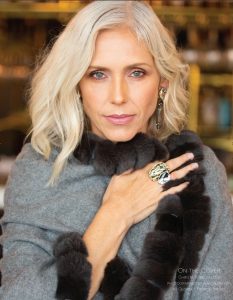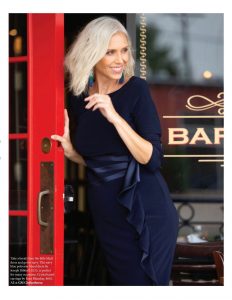My best balcony person played matchmaker for this Table Talk conversation with international supermodel Christa Rude Vazeos. Few of us would understand what it takes for an American girl to move to Paris at 16 and, over 30 years of modeling on every continent except Antarctica, be found by Givenchy, walk the runway for top designers like Yves Saint Laurent, Chanel and Armani, or capture the covers and inside spreads of Vogue, Marie Claire and Elle.
I know a little about the demands placed on the photographer and model by the client. Experience inside my industry, however, isn’t remotely scalable to the toll exacted on an editorial supermodel by prestigious fashion houses and ad agencies in markets like Paris, New York, Milan and Tokyo.
I do speak the language of decorum, and this is where my path connects with this lovely, trilingual, entrepreneurial woman who lives and works between Wichita, Kansas, and Athens, Greece, where she lived for 20 years after being based in Paris for a decade and today still maintains a residence. This is a conversation for all of us regardless of age or gender about something Christa has branded Universal Style TM.
Christa explains that Universal Style TM is about engaging meaningfully with others through heightened awareness, and she elevates the conversation to talk about what this means for the young professional. Universal Style, she suggests, is about consciously choosing to be others-directed instead of pervasively self-focused. She models for us that we can’t live our lives outwardly and in support of others unless we first take the time to consider whether our person (including but not limited to our carriage, eye contact and the care with which we dress), words, attitude, home, table and more signal to others that we respect them and wish to bring something to our time or relationship with them.

Tell us about you and your company Role Models International.
I still model and act internationally, enjoying both high fashion and commercial work. Role Models International (RMI) is about using what I know about fashion and all facets of international culture to help others learn to be global citizens. Soft-skill management and style are so important! I facilitate workshops for all ages, including a table talk workshop on Universal Style and my proprietary I2!TM workshop. I enjoy consulting and speaking, volunteering with homeless shelters in Wichita and supporting Syrian refugees in Greece.

I mentor business professionals, models, moms and college students … and have even enjoyed Universal Style skill building—starting with please and thank you very much and you are welcome—with 3rd and 4th graders through games and role playing. One of the most fun things I’ve ever done was host a princess tea party to teach etiquette. The guests came in a special outfit and were officially announced at the door.
Explain I2!TM
The name of the workshop comes from the two “I”s of creating your own personal Universal Style—inspiration and innovation—and cultivating the belief that says I too can be a global citizen and change the world. I too matter. I too am important.
As with all endeavors, this is personal. I was grateful to model for Lagerfeld and the House of Chanel for seven years … to be the face for Yves Saint Laurent and others. I don’t regret any of the grueling hours or hard work. But models get to a certain age and ask, how do I continue? We all need therapy to get through what happens when you’re just dropped like a hat. In the modeling world, when the market is no longer excited about you, you rebrand yourself. You cut or color your hair, go more contemporary than classic, more commercial than editorial. I find inspiration helping young models prepare for that … now, with the internet, they can continue their educations online. And I’m still busy as a classic model, doing commercials more than editorial.
I am trying to be impactful and remain busy and working by connecting my past, present and future. I love helping moms, for example, find their next steps when their kids leave the home and they’re trying to decide whether to change careers or leave the workforce … guiding them to I too still matter. I too am still important. My mother, who passed a few years ago, said every chapter of our lives has something to celebrate. It’s fun to explore that with ladies’ groups.
You are leaving for Europe for four months with a carry-on suitcase?
[Laughing.] That’s the plan. I’ve recently started working with an associate director/producer who makes independent films and documentaries. He’s originally from Hesston, near Wichita. I’m traveling with him to the film festivals across Europe to promote “Little Satchmo,” a documentary film that world-premiered last summer in Greece about the life of Sharon Preston-Folta, the daughter of legendary jazz musician Louis Armstrong. The film has gone wild in Europe. Sharon, who kept the secret of her famous father until the release of her memoir 10 years ago, is such an inspiration.
We’ll start in Spain … in Madrid … and I’ll also see my daughter Emilea in Marbella. We’ll visit Milan in Italy and Florence, where Sharon will join us and we’ll stay in an old villa overlooking the city. The open film festival there will be themed “Little Satchmo” the first evening. I’ll mentor design students with Universal Style and help with the fashions and runway for them when they model to interpret the Louis Armstrong jazz period of the ’30s, ’40s and ’50s. We’ll visit Lake Como, Lugano and different villages in the Swiss Alps. Later, after stopping in Santorini in Greece, we’ll go on to Athens, where I will see my home after a time away and paint a few walls.
Tell us about Emilea.
Emilea attended the International School of Athens through the 4th grade, and I believe this is where the concept of universal style really came alive for me. There is such an emphasis there on empathy, integrity, compassion and respect for others.
When my mother became ill we returned to Wichita and Emilea became the sixth generation of family to graduate from East High school. She made the tennis team at Wichita State University (her father was a professional tennis player in Greece, and Emilea has played since she was 4), but COVID happened so Emilea reconnected with old friends from the International School and decided to go abroad. “Mom, you moved to Paris at 16. At 5’4” I can’t model, but I still want to travel.”
Today, Emilea is 19 and attends the Swiss college Les Roches on the Spanish Mediterranean in Marbella, Spain. It’s a private hospitality management university, accredited along with universities like Cambridge and Notre Dame, by the New England Commission of Higher Education. At Les Roches, you must be completely business ready, showing up to class in a suit. When Emilea first started school, she complained, “I don’t like the white tailored shirt … I don’t want to wear a jacket.” By week two, she was fine, and now when she comes home even her casual style is careful … grays and blacks, plain t-shirts … things that are not too sloppy … clean makeup … clean hair not tied up in a scrunchy.

They learn the art of fine dining at one of the university’s private restaurants. They’re taught how to choose, taste, talk about, drink and pair wine.
What inspired you to work the concept of universal style into your coaching and mentoring work?
What I experienced on a world spectrum is real for all of us. We come to the table with people we don’t know. We intermix at events in life and work. Mastering soft skills is mastering style. Fashion fades. The kind of style that allows us to be comfortable, relevant and impactful lasts forever.
So Universal Style has a fashion component, skills component and outward focus?
How we present ourselves to the world is important. When we take care with our appearance we are more comfortable and relatable, not fidgety, and we set others at ease. Fashion is fashion, and I do spend time leading people to learn about fashion and understand what is classic, what is a trend, what is style. Style is personal. I ask students to prepare an inspiration board comprised of the things that inspire them … colors … places … people. Their boards feature or represent so many things … beautiful crystal … Coco Chanel …black and white … the color green … being organized. Personal style is built on our natural affinities.
I think of my Universal Style platform as Old-World etiquette paired with a spirit of innovation. Part of innovation is taking the past and integrating it with who you are today and where you want to go and serve and be significant. This is true for young professionals, and it is as true for those of us in our 50s, 60s, 70s and beyond. Good manners and consideration of and respect for others open doors for us. Etiquette—soft skills—is foundational.

And yes, personal style and good manners prepare us to be present with others and serve … to be outwardly focused.
This is hard work. Understanding what we have and can give can be such a challenging season in our lives.
Tell us about your work with university students.
I love Gen Z. I have observed this generation is more observant than vocal. They’re active and curious and forward. I work with a business school to facilitate a pilot program to integrate personal development … to acclimate smart, aspiring kids to the global marketplace and give them ivy league social skills. Through Universal Style and personal branding workshops, I help students develop a foundational business look, learn through a Smart Shopping class how to recognize, shop for and care for quality clothing materials, how to prepare for travel, and how to pack a carry-on bag for a weekend seminar or week away.
I explore dining etiquette. I call it table talk so we have that in common. It’s not just about sitting at a table and using a fork. It’s about entering the room of a business event, carrying oneself well, understanding the dynamics of the room, engaging in conversation, knowing when to sit down, when it’s appropriate to leave … it’s about how to read an invitation to know how to dress … how to look people in the eye and be expressive and participate in a conversation … how to find commonalities … learning to say thank you, and, something very powerful, learning how to gracefully accept someone’s thanks.
My goal is to help students become more natural in any situation—not perfect, but to flow and be comfortable and relatable. I want them to learn to communicate beyond verbal language so they can go beyond borders.
Editor’s note: Benefactor Peri Widener founded the Widener Global Leaders Program at WSU’s W. Frank Barton School of Business, the program to which Christa brings Universal Style and personal brand coaching. CEO of GloBil Consulting Group (which focuses on providing business insight and advice to global organizations) and formerly a 35-year career senior executive at the Boeing Company, Peri is invested in helping students develop into leaders with a global mindset. She believes leaders need more than business acumen; they must be good listeners and good communicators who embrace diversity and are respectful of other cultures. Christa relates that Boeing sent Peri to New York for two weeks for business “finishing school” to prepare her to represent the company. That immersion, she says, is a mirror of what her Universal Style coaching can do for educational institutions and best-practice companies.
You engage real-time pros to chat with and mentor students.
Yes. I facilitate style panels with satellite professionals from Europe who offer their time through video chats to speak about what life is like in their countries and in their places of work … the attitudes among co-workers, how they dress for work, how they adapted to changes in their careers. [Smiling] Affirming my table-top work with the students, one professional talks about growing up on the Left Bank in Paris and learning how to handle herself naturally from having five-course, sit-down meals every Sunday.

I help students with logistics that are overlooked today. What is the best angle for a professional head shot? What is the best way to stand when you do a media conference or appearance? What is the best lighting for you … even online when you are participating in a zoom call?
Through role play these global leaders even model how one works in times of dispute.
And together we ultimately lead students to ask how they will make the most of themselves to make the most of their future communities.
How do students respond to what you mentor and coach?
No one wants to be taught etiquette. They won’t realize the benefits of many of the things they are taught until they’re in a situation to use them. We do see a lot of change and great outcomes from students who are open to the idea; that pleases both students and parents and will thrill future employers.
I am concerned these things aren’t taught in our American households anymore, and if they are taught in the home they need to be affirmed outside it. It’s cemented then. I will tell you from my international experience that Americans get stereotyped as slouched over and unrelatable. We don’t get vast opportunities like Europeans to intermix at a young age with people of different languages, mannerisms and social traditions. I remember the bomb scares during the Gulf War … how loud the Americans were on the subway … keeping my head low because people were offended by them and looking at me, identifying me in that same way.
Likewise, a young person being considered for hire is being watched! How they chew or cut their food are take-aways for a prospective employer. [And here Christa repeats herself] … Saying thank you … that’s always compelling!
How does Universal Style relate to the rest of us?
I believe it starts with recognizing that there will always be someone and something we can learn from and the importance of remaining open. It’s so much fun to learn. I have so many silly stories from my years of travel … how I learned a language … how I made mistakes … what it was like to sit down with royalty and be so disappointed … we never know where our answers are, but they are all around us and we must be ready to come to the table with an open heart and open mind to have the conversations we seek.
Universal Style is about helping those around us feel comfortable. It’s about being relatable in all situations …that is the basis for life success. I have been judged a lot by the way I look. That’s superficial. It’s not important. It’s not relevant.
So Universal Style is your legacy and home is anywhere in the world?
I want to be an inspiration to people … to help them know they can come from anywhere and do anything. Everyone has an opportunity to pursue their dreams. Everyone has an opportunity to give back in some way. I want to inspire confidence and character. I want to help as many people as possible bring presence, perseverance, empathy and cultural understanding to the world stage, their families, communities of friends and the institutions of which they are a part.
Yes, I am at home anywhere in the world. But after 30+ years living and working internationally all over world, I’ve come back to my roots. My grandmother gave me her grandmother’s sampler that hangs today in my entryway so I see it when I come and go. Travel east, travel west, after all, home’s best.

Afterword
It’s early morning and I am processing all of this over a first cup of coffee. It has been my desire with Juliet Rome to honor God and others, point to things that are praiseworthy, encourage the reader and elevate beauty. It follows that I would try to understand the line between vanity and Christa’s branded concept called Universal Style. I realize the one word she used that is the key to this is fidgety.
I remember the wedding reception we recently attended and the guest who pasted himself against a wall because, he fretted, he was underdressed. I remember my own fidgeting with my gold pashmina during the wedding in a spectacular cathedral because it kept slipping from my shoulders. Wearing a ball cap to dinner, coming to the table directly from a hard workout, refusing to submit to a dress code, bringing a heart or face of stone and silence to a gathering … on perhaps a graduated scale these occurrences all have the hint of disrespect in common. They misdirect attention from the things or people that matter.
More important, whether we are fidgety because something about our person is off for the occasion or we are made uncomfortable by the glances or attitudes sent our way, we lose the ability to be fully present—fully relatable, Christa tells us—and that is loss. We subtract from any opportunity to enjoy, give, celebrate or honor. And that amounts to poor stewardship of the gifts and talents we have been given to bless others.
So, no, this aspiration Christa calls Universal Style is not vanity. I believe it is a responsibility.
If we adhere, respectfully and in authentic response to the code of conduct assigned to our occasion, we gain admission. Through the “door” we can be comfortable being our unique self. We might even be met with appreciation for our unique brand and interest. Christa shared the story of one of the CEOs who attended the graduation of students in her Universal Style and personal branding class (each student shares a CEO mentor over the year). She arrived “wearing a beautiful, foundational look—black trousers, white shirt, gold cardigan. Her universal style is elegantly classic. Inspired by her family, in particular her vivacious grandchildren, she pairs her classic style with short pink hair. The way she held herself, handled herself … very well done, and I loved, loved her pink hair. She appeared comfortable and relatable, and it inspired me to want to talk further with her.”
For understanding the concept of permissions, this new insight and the possibility of heightened awareness, I say thank you, Christa. Readers, follow Christa Rude Vazeos on Instagram, or find her on Facebook. To schedule her for consulting, speaking or a Universal Style presentation, reach her at WhatsApp #+1(316)882-3823.



